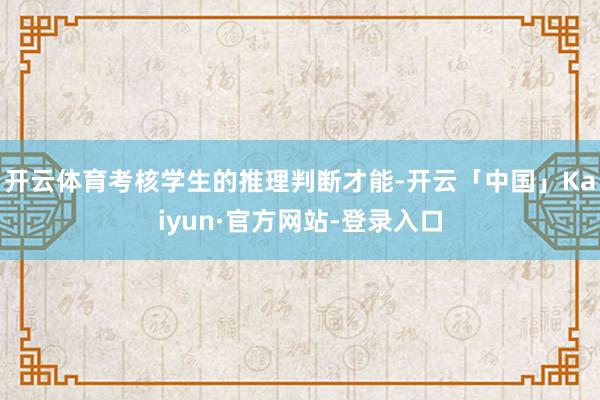开云体育考核学生的推理判断才能-开云「中国」Kaiyun·官方网站-登录入口
新闻中心
开云体育考核学生的推理判断才能-开云「中国」Kaiyun·官方网站-登录入口
发布日期:2025-05-14 08:22 点击次数:81

Once there lived a wise man. He was worried about his son's future because his son was lazy. One day, he said to his son, "I want you to find some treasure. I have drawn a map to guide you".
The son set out the next day Along the way, he was helped by someone with food and by someone with rooms to live in. He came across robbers (匪贼). He also saw changing scenery and seasons. Finally, after a long year, he got to the place his father had said. It took him two days to look for the treasure but found nothing.
张开剩余93%So he had to get back to his home. Sometimes, he would stop to enjoy the beauty of nature.
He also learnt to make meals. He even had to fix his clothes himself. He met the same people who had helped him earlier. This time, he stayed and helped them in order to repay them.
When he got home, he apologized to his father for not finding the treasure. "There wasn't any treasure, " the father answered with a smile. "But I think you have found your life's true treasure. "
(41)What did the wise man tell his son to find?
A. His future. B. A map. C. Some treasure. D. A special place.
(42)What didn't the son see during the journey?
A. Robbers. B. Sea. C. Scenery. D. Rooms.
(43)Did the son find the treasure at last?
A. No, he found something.
B. Yes, he found a map.
C. Yes, he found robbers.
D. No, he found nothing.
(44)According to the passage, which of the following is NOT true?
A. At first the son was really lazy without future.
B. The father was worried about his son's life.
C. He didn't fix his clothes himself on his way back.
D. The son helped the people who had helped him before.
(45)What is the best title?
A. The true treasure in your life.
B. The hard experience of the lazy son.
C. Helping others means helping yourself.
D. Follow your father’s advice when you are young.
二、试题谜底及巨擘分析解读:41.
题型:细节证据题
谜底:C. Some treasure.
解题及分析进程:
正确选项C:“Some treasure.” 文中明确提到:“I want you to find some treasure.”,即智者让他的男儿去寻找矿藏。
装假选项分析:
A. “His future.”:乘间投隙,文中并未说起让男儿去找他的将来。
B. “A map.”:掉包意见,文中提到舆图是为了指引男儿找矿藏,而不是让男儿去找舆图。
D. “A special place.”:乘间投隙,文中并未说起让男儿去找一个相配的场合。
命题尺度与解题抑遏:
命题尺度:平直援用文中的原话进行发问,考核学生对细节的把抓。
解题抑遏:学生可能因对著作证据不透澈或唐突大意而选错谜底。
42.
题型:细节证据题
谜底:B. Sea.
解题及分析进程:
正确选项B:“Sea.” 文中提到男儿在路径中看到了匪贼、变化的时势和季节,以及有东说念主提供的食品和住处,但并未说起他看到了海。
装假选项分析:
A. “Robbers.”:文中明确提到男儿碰到了匪贼。
C. “Scenery.”:文中明确提到男儿看到了变化的时势。
D. “Rooms.”:文中明确提到有东说念主为男儿提供了住处。
命题尺度与解题抑遏:
命题尺度:列举文中提到的施行,并加入一个未说起的施行看成干预项。
解题抑遏:学生可能因对著作细节顾忌不清而选错谜底。
43.
题型:细节证据题
谜底:D. No, he found nothing.
解题及分析进程:
正确选项D:“No, he found nothing.” 文中明确提到:“It took him two days to look for the treasure but found nothing.”,即男儿找了两天矿藏但什么也没找到。
装假选项分析:
A. “No, he found something.”:与文中刻画相背,男儿没找到矿藏。
B. “Yes, he found a map.”:文中提到舆图是父亲给的,不是男儿找到的。
C. “Yes, he found robbers.”:天然男儿碰到了匪贼,但匪贼不是矿藏。
命题尺度与解题抑遏:
命题尺度:平直援用文中的原话进行发问,考核学生对细节的把抓。
解题抑遏:学生可能因对著作证据不透澈或唐突大意而选错谜底。
44.
题型:推理判断题
谜底:C. He didn't fix his clothes himself on his way back.
解题及分析进程:
正确选项C:“He didn't fix his clothes himself on his way back.” 文中提到:“He even had to fix his clothes himself.”,诠释男儿在路径中学会了我方修补穿着,与C选项各异。
装假选项分析:
A. “At first the son was really lazy without future.”:文中提到男儿来源很懒,且父亲牵挂他的将来,此选项正确。
B. “The father was worried about his son's life.”:文中提到父亲牵挂男儿的将来,不错测度出父亲牵挂男儿的生计,此选项正确。
D. “The son helped the people who had helped him before.”:文中明确提到男儿匡助了之前匡助过他的东说念主,此选项正确。
命题尺度与解题抑遏:
命题尺度:通过反问或含糊体式发问,考核学生的推理判断才能。
解题抑遏:学生可能因对著作证据不透澈或受到干预项的影响而选错谜底。
45.
题型:主旨标题题
谜底:A. The true treasure in your life.
解题及分析进程:
正确选项A:“The true treasure in your life.” 文中通过敷陈男儿寻找矿藏的故事,最终揭示出真的的矿藏是男儿在路径中获取的成长和履历,与A选项相符。
装假选项分析:
B. “The hard experience of the lazy son.”:天然男儿履历了贫困的旅程,但著作的重心不是强调他的懒惰或贫困履历。
C. “Helping others means helping yourself.”:天然文中提到男儿匡助了之前匡助过他的东说念主,但这并不是著作的主旨。
D. “Follow your father’s advice when you are young.”:天然男儿听从了父亲的残忍去寻找矿藏,但著作的重心不是强调要听从父亲的残忍。
命题尺度与解题抑遏:
命题尺度:通过索要著作东旨或中心想想进行发问,考核学生对著作全体施行的证据和把抓。
解题抑遏:学生可能因对著作东旨证据不准确或受到干预项的影响而选错谜底。
三、试题高频高难中枢单词深度理解:1.treasure /'treʒər/
词性: n. 词义: 张含韵,矿藏 短语/句型: treasure hunt (寻宝); buried treasure (埋藏的矿藏) 近义词: wealth, riches 反义词: poverty, nothing 例句英文: He spent years searching for the lost treasure. 例句汉文: 他花了数年时分寻找失意的矿藏。2.journey /'dʒɜːni/
词性: n. 词义: 旅行,旅程 短语/句型: a long journey (资料旅行); go on a journey (去旅行) 近义词: trip, voyage 反义词: stay, remain 例句英文: The journey took them through many different countries. 例句汉文: 他们的旅程穿越了多个不同的国度。3.robber/'rɒbər/
词性: n. 词义: 匪贼 短语/句型: rob someone at gunpoint (持枪抢劫某东说念主); a robber's den (匪贼窝) 近义词: thief, bandit 反义词: policeman, hero 例句英文: The robber was caught by the police and put in jail. 例句汉文: 匪贼被警员收拢并关进了监狱。4.scenery/'siːnəri/
词性: n. 词义: 时势,茂盛 短语/句型: beautiful scenery (飘逸的时势); enjoy the scenery (赏玩时势) 近义词: landscape, view 反义词: ugliness, ugliness 例句英文: The scenery along the river was breathtaking. 例句汉文: 沿河的时势令东说念主叹为不雅止。5.repay /rɪ'peɪ/
词性: v. 词义: 偿还,答复 短语/句型: repay a debt (还债); repay someone's kindness (答复某东说念主的好意) 近义词: reward, reciprocate 反义词: owe, borrow 例句英文: He promised to repay the money he borrowed from me. 例句汉文: 他容许会偿还从我那处借的钱。 四、试题长难句分析:1. The son set out the next day along the way, he was helped by someone with food and by someone with rooms to live in.
翻译: 男儿第二天就动身了。一起上,有东说念主给他食品,有东说念主给他住处。 句子分析: 这是一个复合句,由两个分句构成。主句是“The son set out the next day”,其中“The son”是主语,“set out”是谓语,“the next day”是时分状语。另一个分句是“along the way, he was helped by someone with food and by someone with rooms to live in”,其中“he”是主语,“was helped”是谓语,“by someone with food and by someone with rooms to live in”是介词短语作状语,示意被匡助的时势和施行。 遑急语法点: 介词短语作状语;比肩结构(by someone with food and by someone with rooms)。 短语句型: set out (动身);be helped by (被...匡助)。2.He came across robbers and he also saw changing scenery and seasons.
翻译: 他碰到了匪贼,也看到了不停变化的时势和季节。 句子分析: 这是一个比肩句,由比肩连词“and”通顺两个简便句。第一个简便句是“He came across robbers”,其中“He”是主语,“came across”是谓语,“robbers”是宾语。第二个简便句是“he also saw changing scenery and seasons”,其中“he”是主语,“saw”是谓语,“changing scenery and seasons”是比肩宾语。 遑急语法点: 比肩句;比肩宾语(changing scenery and seasons)。 短语句型: come across (偶遇,碰到);changing scenery and seasons(不停变化的时势和季节)。3.It took him two days to look for the treasure but found nothing.
翻译: 他花了两天时分寻找矿藏,但什么也没找到。 句子分析: 这是一个复合句,但存在语法装假。正确的抒发应该是“It took him two days to look for the treasure, but he found nothing.”。原句中“It”是体式主语,真的的主语是动词不定式“to look for the treasure”,“took”是谓语,“him”是曲折宾语,“two days”是平直宾语。但“but found nothing”部分坚苦主语,应与前边部分分享主语“he”,并通过逗号或分号与前边部分通顺。 遑急语法点: 体式主语it;动词不定式作真的主语;比肩句的正确通顺。 短语句型: It takes/took sb. some time to do sth.(某东说念主破耗几许时分作念某事);find nothing(什么也没找到)。4.He met the same people who had helped him earlier and this time, he stayed and helped them in order to repay them.
翻译: 他碰到了之前匡助过他的东说念主,此次他留住来匡助他们以答复他们。 句子分析: 这是一个复合句,主句是“He met the same people”,其中“He”是主语,“met”是谓语,“the same people”是宾语。定语从句“who had helped him earlier”修饰“the same people”,其中“who”是干系代词指令定语从句,“had helped”是谓语,“him”是宾语,“earlier”是时分状语。比肩句“and this time, he stayed and helped them in order to repay them”中,“this time”是时分状语,“he”是主语,“stayed and helped”是比肩谓语,“them”是宾语,“in order to repay them”是蓄意状语。 遑急语法点: 定语从句;比肩句;蓄意状语(in order to)。 短语句型: the same...who/that...(相似的... who/that...);in order to do sth.(为了作念某事)。 五、往期优质施行:2021年辽宁省葫芦岛市中考英语真题-阅读证据四巨擘深度解读
2021年辽宁省抚顺本溪等初中学业磨真金不怕火-阅读证据四巨擘深度解读
2021年辽宁省丹东市中考英语真题-阅读证据四巨擘深度解读开云体育
发布于:湖南省